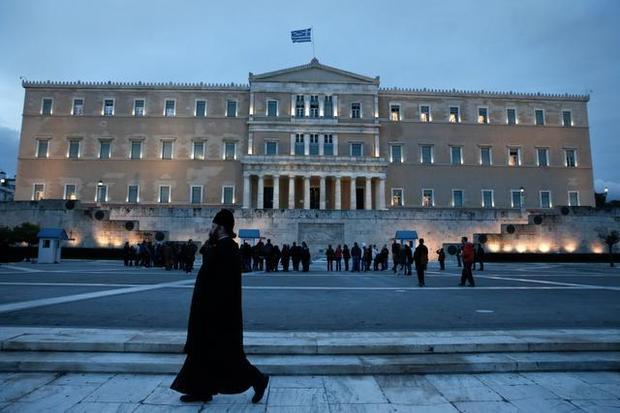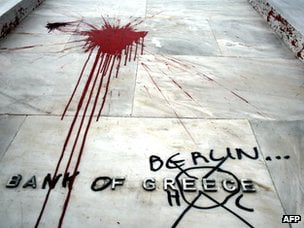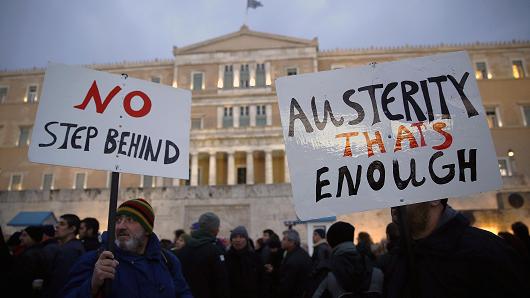The Euro Crisis, along with the USA sub-prime crises are biggest examples of the negative effects of a half-baked monetary and fiscal policy (and how lousy economists are at predicting anything). It’s what all economists call a contagion effect: all those fancy trade linkages that had led to such bombastic growth all those years were now causing a very bad domino effect in these regions. And well, nowadays, Euro Crisis usually leads to lots of head nodding and murmurs of “Greece”.
Ah, Greece. Like that clumsy kid in the canteen who always manages to trip and spill food on every person in his/her vicinity, Greece isn’t exactly garnering any good will. And just like the clumsy kid, it’s not exactly fair to put the entire blame of the situation on it.
WHAT STARTED IT?
What starts all big problems in history? Jhoot. And not a teensy white lie either, this one was big.
When the Eurozone was still a fledgling brainchild, it was decided to keep certain restrictions in mind for member countries, a sort of Mean Girls-eque ‘You’re wearing sweatpants on Monday. You can’t sit with us.’ Except this lunch date involved a budget deficit of 3% of the GDP, so that borrowing for member countries in need would be easier (and risk-free for the others). Greece projected a deficit of 3.4% of the GDP. Yay?

Nay actually. The actual budget deficit was 15% of the GDP and the European Commission did not find it funny. In 2004, they pulled up the Greek government for fudging up their accounts. The Greeks promised to play nice and to improve upon their budgeting skills.
Of course, you can ask here why more serious action wasn’t undertaken. It was a simple case of ‘Pot, Kettle, Black’. At that time, even France and Italy weren’t keeping the strictest watch on their own budgets, so they weren’t very eager to go around pointing fingers.
A CRISIS HATH STRUCK
Clearly the Greeks couldn’t go about fulfilling their promises very well and in 2008, when banks got spooked thanks to the US, Greece also had its big reveal of having done very little to curtail spending and increase revenue.

In 2010, when Greece teetered on the edge of a virtual economic breakdown, the Eurozone scrambled on their backsides to save their collective izzat (see: Euro). A bailout package was offered to the Greeks on the condition that they impose some strict austerity measures which included the usual fare : high taxes , low public spending. I’ve mentioned some more important stuff below :
- Debtors have to be paid before government employees are. Ouch..
- A permanent monitoring commission (overseen by the European Commission) is to be kept in place to make sure that the Greeks are doing whatever they’ve been told to do. Double Ouch.
Not that it’s wrong to have asked reforms from Greece. You have to understand that it’s essentially people from other countries in the Eurozone who would be funding Greece’s bailout package. And it’s these people who want to make sure that their money doesn’t go to waste. This holds true especially for Germay, that is currently the largest contributor to the European Central Bank (ECB), and therefore demanded some of the toughest reforms from Greece.

This entire debacle exposes a fundamental issue with the European Union: their model calls for a UNIFIED monetary policy but DIFFERENT fiscal policies. So, if a country’s government in the Union isn’t known for its ability to bring about meaningful reforms (especially in public investment and tax-collection methodology), it can lead to other countries suffering for no fault of their own per se.
THE RESCUE MISSION
Unemployment at 25%, about 40% of people below the poverty lines and suicide rates up by an alarming amount. Enter, Syriza, the Greek BJP to the Congress-ish Union Government whose austerity measures hadn’t brought about much tangible benefit.
Syriza promised an end to the austerity that had been forcibly imposed on Greeks and had thrown people out of employment and made them completely miserable. They offered an example of the European debt conference that had erased a significant portion of German debt in 1953. Moreover, they promised that if the Eurozone members (especially Germany) refused to comply with their demands, they would divorce from the entire shindig altogether. In short, they offered the Greeks a way to be masters of their own destiny, a Get Free or Leave the Eurozone card.
Most importantly, they cashed in on the ill-will amongst the Greek populace, especially towards the Germans and the Troika (IMF, European Commission and European Central Bank). A smart move, considering most of these individuals had either not seen their salary in months and/or had witnessed their savings get wiped out.

Syriza won.
A TENTATIVE TRUCE ?
A much hyped meeting between Greece and the powerhouses of Europe finally took place on 20th February….and Greece got an extension to their bailout package, subject to the condition that they seriously implement the economic reform plan they have presented to the Eurozone.
After Syriza’s staunchly anti-German campaign, the people in question were naturally unwilling to meet up with their smear campaigners, but it is apparent that a truce has been reached, and no austerity obligations have been ditched….yet.
Naturally, the Greeks aren’t very happy with this settlement. Yet nother promise of acche din has now backpedaled. There has been a spate of protests in Athens, a clear sign of their displeasure.

Both Greece and the Eurozone need each other, alienating the country will help neither stakeholder. If Greece leaves (or is forced to leave), the whole globe could be plunged into another financial crisis, the repercussions of which will be undoubtedly ugly. There’s a lot of bad blood that needs to be sorted out between the member countries before the Eurozone begins its climb yet again to become a viable world organization. As Jigar Moradabadi once put it ‘Aag ka dariya hai, doob ke jaana hai’.
-Gauri Gaur


































